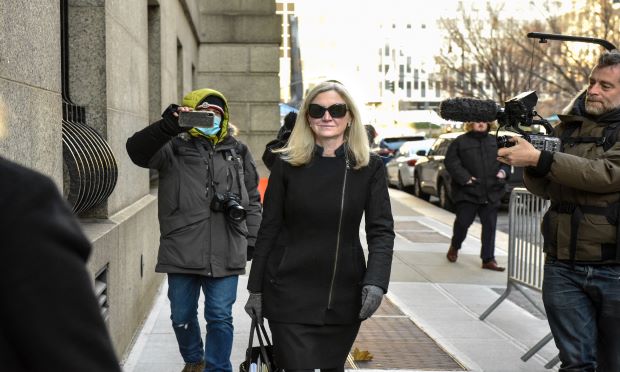Ghislaine Maxwell’s fate in hands of jury as deliberations begin

By Benjamin Weiser, Rebecca Davis O’brien and Colin Moynihan
NEW YORK — A federal jury in Manhattan began deliberations late Monday in the sex-trafficking trial of Ghislaine Maxwell, the former socialite charged with conspiring with Jeffrey Epstein over a decade to recruit, groom and sexually abuse teenage girls.
The jury was sent home after deliberating for about an hour without reaching a verdict and was to continue deliberations Tuesday (21).
The jury received the case after spending most of the day listening to prosecutors and a lawyer for Maxwell clash sharply in their closing arguments over what the government said was Maxwell’s central role in Epstein’s sexual-abuse scheme.
“It is crystal clear that Maxwell knew about and was deeply involved in Epstein’s sexual abuse of children,” Alison Moe, an assistant US attorney, told the jury in a closing argument that sought to tie together the government’s evidence, which was presented over 10 days. “Maxwell was key to the whole operation,” she said.
Moe sought to upend arguments made by Maxwell’s lawyers throughout the trial, from their opening words to the jury to their cross-examination of government witnesses. She recalled the defence’s opening statement, which suggested Maxwell was being blamed for something she didn’t do. Moe said the evidence at trial showed that Maxwell “made her own choices.”
Maxwell’s lawyer, Laura Menninger, acknowledged in her summation Monday (20) that the government had “certainly proved” that Epstein was a “master manipulator” who abused his wealth and privilege. But, she said, “We are not here to defend Jeffrey Epstein.”
“You need to keep your eye on the thing that the government hasn’t — how these stories have changed dramatically over time,” she said.
In a closing argument that was by turns biting, sarcastic and indignant, Menninger urged the jurors to reject the prosecution’s arguments and be sceptical of evidence she called thin and witness testimony she said was flimsy.
“The government wants you to speculate, over and over,” Menninger said, later adding, “Ms. Maxwell does not have to prove her innocence to you. You already know it.”
The closing arguments followed more than two weeks of trial in which the government presented testimony from two dozen witnesses, including four accusers who prosecutors said had been enticed and groomed by Maxwell and essentially served up to Epstein to be sexually abused. Maxwell was present for some of the abuse, the government said.
The defence, which presented nine witnesses over two days, spent much of the trial seeking to distance Maxwell from Epstein, who was found hanged in a Manhattan jail cell in 2019 in a death that was ruled a suicide. But even in death, his presence was felt at the trial — on most days, Epstein’s name was mentioned in court more than Maxwell’s.
“Everyone knew Jeffrey was keeping secrets from Ghislaine, except Ghislaine,” Menninger said, noting the household staff and pilots had concealed Epstein’s other girlfriends from Maxwell.
Near the end of her closing argument, Menninger said Maxwell was on trial because of her relationship with Epstein. “Maybe that was the biggest mistake of her life, but it was not a crime,” she said.
Moe cited records introduced at the trial that showed Maxwell received $30.7 million from Epstein between 1999 and 2007, which is part of the period in which the indictment says she conspired with Epstein to sexually abuse teenage girls.
“Your common sense tells you, you don’t give someone $30 million unless they are giving you exactly what you want,” Moe told the jury, “and what Epstein wanted was to touch underage girls.”
“When Maxwell took that money,” she added, “she knew what it was for — and now you do, too.”
In her summation, Menninger pushed back against the prosecutors’ contention about the transfer of money.
“The government makes a big show of these big dollar transfers,” Menninger said. “That is some thin testimony,” she continued.
She said the prosecution was asking the jury to speculate. “Speculation is not evidence,” Menninger said, adding that Maxwell was not the only person with access to the account to which the transfers were made.
Much of Menninger’s presentation centred on seeking to discredit the testimony of the four accusers of Maxwell — two of whom testified under pseudonyms and a third under only her first name — who described how Maxwell had groomed them for abuse by Epstein.
In a pointed rebuttal, another prosecutor, Maurene Comey, told the jury, “The defence is desperate for you not to believe those women.”
She added, “If you believe those women, the defendant is guilty.”
Comey sounded a note of scepticism about the defence’s argument that Maxwell did not know Epstein had sexually abused teenage girls. “She just didn’t know that her boyfriend and best friend for more than a decade had a thing for teenage girls,” Comey said.
And in response to Menninger’s remarks about the $30 million sent to Maxwell’s accounts, Comey said the transfers were not simply payments to a house manager. “It is ‘we-molested-kids-together’ money,” she shot back.
Comey also ridiculed Menninger’s argument that the witnesses had suddenly “recovered” memories of Maxwell’s role. She said the defence was suggesting that the women’s memories were “implanted into their brains” — “implanted by the media, greedy civil lawyers and the FBI.”
There was no indication, Comey said, that the accusers followed media coverage of the Epstein case. “Not a single witness at this trial suggested for even a moment that the FBI told them what to say,” she added.
-New York Times

